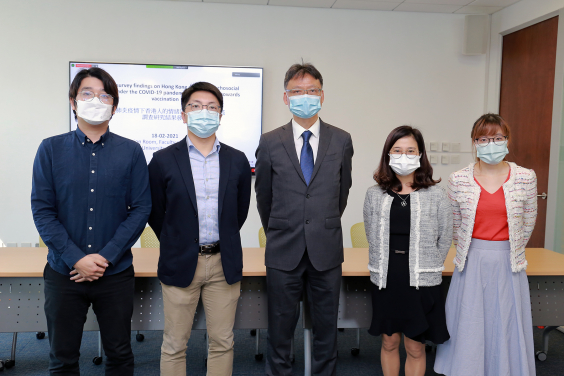
The speakers at the press conference.
(from left)
Dr Ricci Yue, Department of Geography, HKU
Dr Samson Yuen, Department of Government and International Studies, HKBU
Professor Siu-Man Ng, Department of Social Work and Social Administration, HKU
Dr Pamela Leung, Hong Kong Society for Rehabilitation
Dr Bobo Lau, Department of Counselling and Psychology, HKSYU
At the anniversary of the first COVID-19 case in Hong Kong, the Department of Social Work and Social Administration at the University of Hong Kong (HKU) joined hands with Hong Kong Shue Yan University (HKSYU), Hong Kong Baptist University (HKBU) and Hong Kong Society for Rehabilitation (HKSR) to conduct an online survey on Hong Kong citizens' adjustment to the year-long pandemic in late-January.
The survey findings comprise two parts – Part 1 on citizens' psychosocial distress under the pandemic and Part 2 on citizens' perceptions on COVID-19 vaccination. As the population with a chronic illness is likely to be prioritized in the upcoming vaccination programme, with the support from HKSR, the survey compared the responses of individuals with and without a chronic illness. It is hoped that the findings will foster a better understanding over COVID-19 vaccination among the local public.
The survey was conducted between January 22 and 28. A total of 2,733 valid responses (Female/Male = 68.1%/31.9%; Mean age = 44.8, ranged from 18 to 89) were collected, with 921 respondents indicating having one or more chronic illnesses.
The major findings are as follows:
Psychosocial distress
- A substantial portion of the respondents showed moderate to severe anxiety (21.8%), depression (18.3%) or post-traumatic stress symptoms (33.8%) that warrant professional emotional support (See Table 1); 21.5% of the respondents indicated two or more categories of moderate to severe psychological distress.
- 39.7% lacked a supportive social network. Respondents with chronic illness were more likely to be socially isolated than those without (42.7% vs 38.3%).
Perceptions on COVID-19 vaccination
- 39.4% of respondents were willing to be vaccinated now if an authorised vaccine is available to them. The intention to vaccinate was higher among respondents with chronic illness (51.2%) than those without (33.3%). Respondents with higher trust to the government or experiencing more financial stress were more likely to vaccinate (See Table 2).
- When choosing a vaccine, respondents cared most about the efficacy of the vaccine, followed by the chance of severe side effects (see Figure 1). Subsidizing vaccination was found to reduce the desirability of the vaccine, while medical insurance against severe side effects may increase the uptake. In general, an efficacy of 50% or lower and unknown likelihood of severe side-effects were the two most discouraging attributes.
- After the respondents indicated their desired vaccine on the conjoint analysis, they were asked when they would be willing to be vaccinated with that option. 40.6% responses on the preferred time of vaccination fell on the last 10% of the vaccination order, suggesting a substantial reservation against early vaccination.
- COVID-19 testing, intention to vaccinate and occurrence of a confirmed case nearby interacted to impact the preference of the time of vaccination. If the respondents have no intention to vaccinate now or there has been a confirmed case recently in their vicinity, having tested for COVID-19 would infer a preference for later vaccination on their chosen vaccine.
Based on the findings and the sharing from the patient representative, the research team has the following policy recommendations:
A. On relieving psychological distress and social isolation
- Provide financial safety net for individuals whose finances and employment has been jeopardized by the pandemic as financial stress is the key risk for psychological distress.
- Provide transparent and accurate pandemic-related information through trust-worthy channels to prevent excessive health anxiety.
- Re-knit and strengthen community support to close the service gap on emotional support to those with chronic illness, and groups including males, youths, unemployed individuals, and those of higher infection risk in order to prevent the severe emotional sequelae of social isolation and financial stress.
B. On strengthening the vaccination programme
- Vaccines should be made free-of-charge with medical insurance against serious side-effects for all citizens. An extra living subsidy can be made available to those with a chronic health condition to boost vaccine uptake.
- Subsidies are unlikely to increase the willingness of vaccination and are thus unnecessary.
- Information about the vaccines, especially their efficacy and side-effects, should be made as transparent as possible, as uncertainty and low trust to the authority were prominent factors against timely vaccine uptake.
- The government may also consider the potential effect of virus testing in delaying citizens' preferred timing for vaccination through a false sense of protection against infection. The vaccine promotion campaign should focus on the protection effect of the vaccine.
- The government may consider prioritizing vaccination for citizens who are more likely to vaccinate earlier, such as older citizens, patients with chronic illness and people in high-risk jobs.
C. Targeting population with chronic illnesses
- Enhance frontline health professionals' knowledge about COVID-19 vaccine in order to address enquires about the vaccine from patients with various types of chronic illnesses, hence increase their confidence and motivation to vaccinate.
- Devote resources to social service organizations and self-help organizations of persons with chronic illnesses to provide more frequent engagement and support to population with chronic illnesses, screen for patients with severe social isolation and psychological distress, and hence provide timely interventions and follow-up actions.
"Chronic illness patients are experiencing greater social isolation, but tend to have higher intention to vaccinate. We welcome the government prioritizing their vaccines toward this population, which will facilitate a head-start to the coming vaccination programme," the research team remarked.
Please click here for the full press release and detailed findings.
Please click here for the presentation powerpoints.






